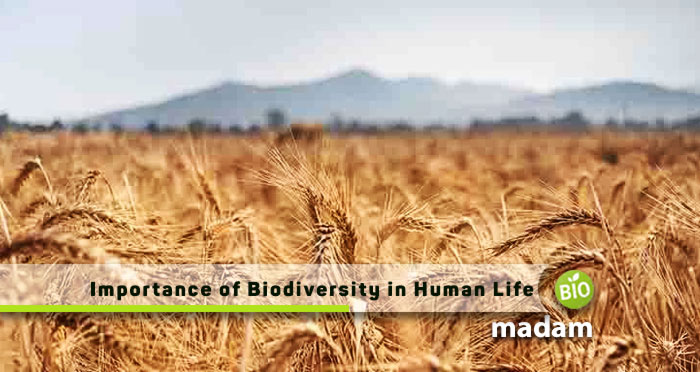Recently updated on June 16th, 2023 at 07:58 am
Biodiversity refers to the diversity of macro and microorganisms on Earth, including plants, animals, fungi, bacteria, viruses, etc. They contribute to food chains and food webs and help in the maintenance of the normal functioning of biomes and ecosystems. Besides the impact of humans and climate on the biomes, they also play a major role in human life. There are different types of biodiversity that directly impact our lives in more ways than one. They provide a variety of organisms around us that may be of medical or economic importance. Keep reading to learn about the importance of biodiversity in human life.
Food
The most important application of biodiversity in our ecosystems and communities is the food sources they offer. As biodiversity comprises all animals, plants, fungi, and other organisms, they allow us to enjoy different foods. You can find hundreds and thousands of species and subspecies of animals and plants to provide us with a massive variety of foods to choose from. It gives vegetarians, vegans, and omnivores plentiful options to fill their stomachs and get the energy for the day.
In the past, people survived on a mix of diets, including common crops, animal sources, seeds, grains and wild greens. These crops have adapted to the specific conditions in different types of ecology. Thus, they could strive in all conditions and provide nutrition when other plants and animals cannot survive. Yet, the intake of these eatables has decreased recently due to the changes in diet.
Crops like rice, wheat, barley, and corn give around 60% of the total nutrition the human population receives from plant sources. These crops are also the main source of income in agricultural countries that rely on agriculture in their economy. We will discuss this later in the article in detail.
Health
Biodiversity also plays a major role in human health by allowing us to produce medications. Higher biodiversity means better human health, providing better opportunities to research and find effective solutions. Plants provide cancer drugs and medicines used for other diseases and disorders. Rainforests help give around 25% of modern drugs as well as 70% of cancer drugs.
Moreover, animals also play a role in identifying potential solutions to diseases. One such example is insulin. Insulin is derived from the beta cells of the pancreas pf cattle and injected into humans through genetic engineering. Moreover, different ecosystems and communities help reduce the spread of diseases. However, the reduction in ecosystems due to urbanization has led to an increase in disease spread to humans. Over 50% of infectious diseases originate from animals, and fewer ecosystems provide an opportunity for animals to be closer to humans. Thus, these animals act as vectors to bring disastrous diseases to the human population. The outrage of Covid infection is such an example.
Income Source
Biodiversity has a major influence on the income and livelihood of people in different parts of the world. Natural ecosystems contribute around $125 trillion of the total global revenue annually. For example, agricultural countries like Pakistan depend majorly on the natural ecosystems, especially crops, to generate income for the country. Moreover, a significant population in India also depends on the agricultural sector. 57% of India’s rural communities’ livelihood relies on forest ecosystems. Globally, the agricultural sector provides employment to 60% of the world’s poor working class. In the South region, they provide a livelihood to 1.6 billion people.

Business
Typically people think that the removal of biodiversity in the form of urbanization and deforestation provides better business opportunities. In reality, it is the opposite, Reserving biodiversity and natural ecosystems can be more beneficial to businesses. The World Economic Forum mentions that more than half of the global GDP depends on nature in some way. Eventually, the decrease in biodiversity is harming many businesses as well. One prominent sector is the pharmaceutical business which depends widely on nature. Extinction of species will not only harm the pharmaceutical business and impact treatment options. Moreover, the food industry relies on nature to provide food to people in all parts of the world.
If you wonder that restoring nature will cost more than it will offer benefits, you might be surprised to know that it’s not the same. Every dollar spent on the restoration of nature offers $9 in economic benefit. Utilizing modern technology and more sustainable options will also allow businesses to thrive in the coming years.
Protection
As mentioned earlier, biodiversity is essential for life on Earth. The animals, fungi, algae, plants, microorganisms, and all life forms contribute to other organisms’ lifecycles. A wide variety of biodiversity makes the Earth habitable and protects us from natural disasters. For example, trees protect us from floods and strong winds and prevent soil erosion.
If the loss of biodiversity continues at this rate, we will soon face major natural disasters that will have no shield. Reports show that the loss of mangroves puts 18 million more people to flood risk.

The Bottom Line
The importance of biodiversity is undeniable. The vast variety of organisms on Earth makes it possible for us to enjoy different food choices, including vegetarian and non-vegetarian options. It also enables people to get employment and earn a livelihood by trading materials and products from the significantly biodiverse environment. Humans are damaging this environment in search of better urbanization and development opportunities. The failure to save biodiversity will stop the sources of food, medication, livelihood, and protection against disasters.
However, micro and macroevolution play a major role in determining biodiversity besides human factors. The sustenance of species is essential for the food and health needs of humans. Some species will evolve, and some might go extinct. We might be unable to stop it when it happens due to natural changes. But, we can protect the biodiversity lost due to urbanization and deforestation. Protecting biodiversity is important for survival as it makes the Earth inhabitable. At the same time, it also contributes to the global economy.

Jeannie has achieved her Master’s degree in science and technology and is further pursuing a Ph.D. She desires to provide you the validated knowledge about science, technology, and the environment through writing articles.

